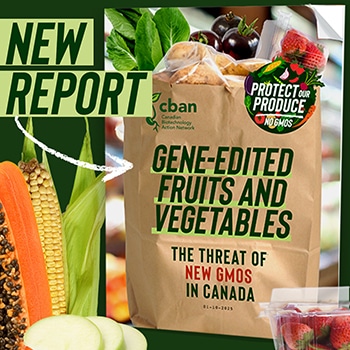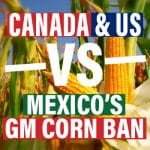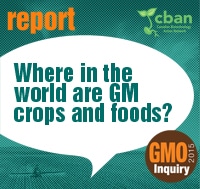Corn
Market Status
Most genetically modified (GM or genetically engineered) corn ends up as ingredients in processed food or as animal feed.
- Approximately 88% of the grain corn grown in Canada is GM.

- There is only a very small amount of GM sweet corn grown in Canada and the US but, in 2024 and 2025,
- There is no GM popcorn on the market.
Read CBAN’s new report Gene-Edited Fruits and Vegetables: The Threat of New GMOs in Canada, October 1, 2025.
Genetically modified corn is engineered to be toxic to particular insects. The GM technology transforms the corn plant into a pesticide. The toxin, the soil bacteria Bacillus thuringiensis or Bt, is expressed in every cell of the plant including the corn kernels. If certain insect pests, try to eat the corn, they will die. The Bt toxin attaches to receptors in the gut of some insects, rupturing the gut and killing the insect. All of the Bt insect-resistant corn sold in Canada is now also herbicide tolerant.
Take Action
Is your sweet corn genetically modified?
 The only way to find out is to ask. You have a powerful voice when you ask your local farmer or write to the head office of your grocery chain.
The only way to find out is to ask. You have a powerful voice when you ask your local farmer or write to the head office of your grocery chain.
- Ask your farmer at the roadside, farm gate, or farmers’ market if they are selling GM sweet corn. You can even ask the Farmers’ Market to check for you.
- Write to the head office of your grocery store and ask them to remove GM sweet corn from their store. Tell them you don’t want to buy it. Click here to for grocery store contacts.
- Buy organic sweet corn – organic farming prohibits GM seeds and synthetic pesticides.
Consumer Action Guide: Click here for information on GM sweet corn to help you take action. Your consumer actions are making a difference!
Updates
CBAN Factsheet: Genetically engineered Bt insect-resistant corn poses human health risks, May 2024
March 2025: Mexico has enshrined a ban on GM corn cultivation in the constitution.“Corn is Mexico. We have to protect it for biodiversity but also culturally, because corn is what intrinsically links us to our origins, to the resistance of Indigenous peoples,” said the President of Mexico, Claudia Sheinbaum.
“Sin maíz no hay país” – “without corn, there is no country”
 January 2025: Canada and the US successfully challenged Mexico’s restrictions on genetically engineered (genetically modified or GM) corn as a trade dispute panel ruled against Mexico’s ban on GM corn in food. A 2023 Mexican Presidential Decree had restricted the use of genetically modified (GM or genetically engineered) corn for the flour used to make traditional foods like tortilla. The US government, backed by the Canadian government is challenging the Mexican GM corn ban via the Canada-US-Mexico trade agreement (CUSMA). Canada does not export any corn to Mexico but the Government of Canada wants to force open all markets to genetically modified organisms (GMOs). Click here for more information on the trade dispute www.cban.ca/trade.
January 2025: Canada and the US successfully challenged Mexico’s restrictions on genetically engineered (genetically modified or GM) corn as a trade dispute panel ruled against Mexico’s ban on GM corn in food. A 2023 Mexican Presidential Decree had restricted the use of genetically modified (GM or genetically engineered) corn for the flour used to make traditional foods like tortilla. The US government, backed by the Canadian government is challenging the Mexican GM corn ban via the Canada-US-Mexico trade agreement (CUSMA). Canada does not export any corn to Mexico but the Government of Canada wants to force open all markets to genetically modified organisms (GMOs). Click here for more information on the trade dispute www.cban.ca/trade.
GM Sweet Corn
Updates – August 2025:
- GM sweetcorn has been identified in Whole Foods stores across the United States and in Canada.
- New disclosure laws in the US mean that the corn is labelled as “bioengineered.” Although it is not mandatory to label genetically engineered foods in Canada, Whole Foods has the word “bioengineered” on the signs for its GM corn in the company’s Canadian locations.
- Identifying and Avoiding GM Sweet Corn Seed in Canada, CBAN Growers Guide
- Consumer Guide: GM sweet corn in Canada.
There is very little GM sweet corn grown in Canada and the US.
- There has been a small (undetermined) amount of GM sweet corn, from Syngenta, on the market in North America from around 2000 (“Attribute”). In 2011 Monsanto (now Bayer) also launched a line of GM sweet corn varieties (“Performance Series”).
- GM sweet corn is the only vegetable and whole GM food that is grown in Canada – as opposed to GM grain corn, which is widely grown in Canada and used for processed into food ingredients, animal feed and biofuels.
- GM sweet corn is the third possible GM fruit or vegetable in the produce section of Canadian grocery stores. There could be some GM papaya (from the U.S. and China only) and some varieties of GM squash (from the U.S. only) that end up on grocery shelves in Canada.
- All of the GM corn varieties currently sold in Canada are genetically engineered to be herbicide-tolerant, and most of these are also insect resistant. In 2023, there were 24 brands of insect-resistant GM corn on the market in Canada: two of these are sweet corn; 22 of the 24 brands (over 90%) are tolerant to the herbicide glyphosate. 19 of the insect resistant corn brands (79%) are tolerant to two or more herbicides and why three brands (12.5%) are tolerant to three herbicides: glyphosate, glufosinate, and 2-4,D.
Sweet Corn Testing in Canada
- September 3, 2020: Since 2015, Quebec group Vigilance OGM has tested sweet corn samples in Quebec and found no GM sweet corn. This year there was limited sampling from 20 grocery stores, so the conclusion is not definitive.
- Significantly less genetically modified (GM) sweet corn was grown in Canada as of 2014, as many farmers and grocery stores started working to remove GM sweet corn in response to consumer concerns. CBAN tested samples of fresh sweet corn in 2014, and talked to seed dealers, farmers and grocery stores. We tested 137 samples of fresh sweet corn in 9 provinces in 2014 and only found one GM sweet corn (see more details below). The Canadian government (Statistics Canada) does not track how much GM sweet corn is grown in Canada.
CBAN continues to work with you to ask farmers and grocery stores to remove GM sweet corn. Please continue to ask at the Farmers’ Market, roadside stands and grocery stores, and know that your actions are making a difference.
- 2020: CBAN Member group Vigilance OGM tested corn samples from 20 stores in Quebec and did not find any GM sweet corn.
- 2016: CBAN Member group Vigilance OGM tested 53 samples of fresh sweet corn in 22 different cities in 2016 Quebec and did not find any GM sweet corn.
- 2015: CBAN Member group Vigilance OGM tested 43 samples of fresh sweet corn in 15 different cities in Quebec in 2015 and did not find any GM sweet corn. Seed sellers are saying that they sell few or no GM sweet corn.
- 2014: CBAN tested 137 samples of fresh sweet corn in 9 provinces and only found one GM sweet corn (sold in a Metro grocery store in Quebec).
- 2013: CBAN tested sweet corn samples from across Canada and found unlabelled genetically genetically modified fresh sweet corn in grocery stores, roadside stands and farmers markets. CBAN testing clearly shows that consumers across Canada could be unknowingly buying GM sweet corn. Press Release – October 23, 2013: Tests Discover Unlabelled GM Sweet Corn in Canadian Grocery Stores and Farmers’ Markets.
November 14, 2013: Following tests conducted in Canada by CBAN, Friends of the Earth US released the results of their tests on sweet corn samples. Tests of sweet corn purchased in the U.S. did not find any GM sweet corn except for two samples, one from Ontario and one of unknown origin. “We were alarmed to find a significant amount of GM sweet corn in Canada, and are shocked that Canada could actually be a source of genetically engineered sweet corn to U.S. consumers,” said Lucy Sharratt, Coordinator of CBAN. New study: GMO sweet corn rare in U.S. supermarkets.
Resources on GM Sweet Corn
- CBAN Grower Guide: Identifying and Avoiding GM Sweet Corn Seed in Canada, September 2025.
- CBAN Consumer Guide: “GM Sweet Corn in Canada: Information for Action”, 2025.
- CBAN’s report (2015) “Where in the world are GM crops and foods?”
Stacked Traits in Corn
Most GM corn varieties on the market in Canada and the US are “stacked” with more than one Bt protein. In 2023, 24 of the 26 varieties of Bt corn on the market in Canada had more than one Bt protein, and all of them also had one or more herbicide-tolerant traits. Eighteen of the 26 products expressed more than two Bt toxins.
Health Canada does not assess the food safety of plants with stacked GM traits: if each of the individual GM traits (events or lines) has been approved, companies are free to stack these traits together without a government risk assessment. For example, in 2010, Monsanto commercialized its first “Smartstax” corn that had eight different GM traits – six insect-resistant traits and two herbicide-tolerance traits – but this product was not assessed for safety by Canadian regulators.
 June 28, 2011 – Press Release: Report Exposes Unstudied Risks of Monsanto’s Genetically Modified “SmartStax” Corn: EU Member State critiques and leaked industry documents uncover safety questions.
June 28, 2011 – Press Release: Report Exposes Unstudied Risks of Monsanto’s Genetically Modified “SmartStax” Corn: EU Member State critiques and leaked industry documents uncover safety questions.
Resources on “SmartStax”
- Summary and Background on SmartStax corn and risk questions from CBAN
- Testbiotech released a critical new report
- Read CBAN’s article in Alive Magazine. February 2010
- CBAN Opinion: Stacked traits lack assessment, Western Producer, October 15, 2009
- Monsanto’s response: Stacked Traits good for growers, Western Producer, November 5, 2009
- Why did Monsanto’s latest foods get a free pass from Health Canada? CBAN article in rabble.ca, September 2009
- Press Release – July 29, 2009: No Safety Assessment of GE Corn by Health Canada: Canada Ignores International Food Safety Guidelines
- Press Release – July 24, 2009: CFIA ’s Irresponsible Rubber-Stamping of New Genetically Engineered Corn No environmental risk assessment, and reduced environmental stewardship requirements for new Monsanto/Dow “SmartStax”
- CBAN’s letter to Health Canada. July 28, 2009
- Response to Health Canada: ‘SmartStax’ Genetic Corn Really Safe? Montreal Gazette, CBAN Opinion Letter, July 30, 2009
- CBAN letter to the Canadian Food Inspection Agency, August 3, 2009
Government Regulation of Stacked Traits
CBAN demands that:
- Health Canada immediately request that the Canadian Food Inspection Agency rescind its authorization of the genetically modified (GM) eight-trait corn called ‘SmartStax’ (Monsanto and Dow AgroSciences)
- Health Canada initiate a full food safety assessment of the GM corn as set out by the Codex Alimentarius Guideline for the Conduct of Food Safety Assessment of Foods Derived from Recombinant-DNA Plants.
- Health Canada request the Canadian Food Inspection Agency halt any further approvals of stacked trait products until Health Canada has reviewed its Novel Foods Regulations and initiated a system-wide review of the entire regulatory system for GM foods and crops (“Novel Foods” and “Plants with Novel Traits”).
- Click here to read the full letter from CBAN to Health Canada. July 28, 2009.
- Read the Minister of Health’s response.
- Click here to read CBAN’s letter to the Canadian Food Inspection Agency, August 3, 2009.
- Read the CFIA’s response to CBAN.
The UN Codex guidelines for GM food safety assessment state that “unintended effects in recombinant-DNA plants may also arise through the insertion of DNA sequences an/or may arise through subsequent conventional breeding of the recombinant-DNA plant.’’ (this is how stacked trait GE crops like ‘SmartStax’ are produced – through the conventional breeding or crossing of GM plants) and that such crops should go through a full safety assessment (para 14, CAC/GL 45-2003).
The international Codex Alimentarius Guideline for the Conduct of Food Safety Assessment of Foods Derived from Recombinant-DNA Plants clearly recommends safety assessments of stacked trait GE crops. The Guideline clearly states that unintended effects can arise not only from genetically engineered (GE) plants, but can also arise when those GE plants are crossed via conventional breeding (as in the case of stacked-trait crops such as ‘SmartStax’): “Unintended effects in recombinant-DNA plants may also arise through the insertion of DNA sequences an/or may arise through subsequent conventional breeding of the recombinant-DNA plant” [boldadded] (para 14, CAC/GL 45-2003). Furthermore, the Guidelines also state that such crops should go through a full safety assessment: “The assessment for unintended effects takes into account the agronomic/phenotypic characteristics of the plant that are typically observed by breeders in selecting new varieties for commercialization. These observations by breeders provide a first screen for plants that exhibit unintended traits. New varieties that pass this screen are subjected to safety assessment as described in Sections 4 and 5” [bold added] (para 17, CAC/GL 45-2003).
2,4-D-Tolerant Corn
Canada has approved 2,4-D-tolerant GM corn and soy. On October 15, 2014, the US government also approved Dow’s 2,4-D/glyphosate herbicide mix, to go along with GM 2,4-D tolerant crops. Now Dow AgroSciences has all the approvals it needs to start marketing these GM herbicide tolerant crops in Canada and the US.
Resources
 Identifying and Avoiding GM Sweet Corn Seed in Canada, 2024 Information for vegetable growers
Identifying and Avoiding GM Sweet Corn Seed in Canada, 2024 Information for vegetable growers- “GM Sweet Corn in Canada: Information for Action” 2024 Details on GM sweet corn. Get your questions about GM sweet corn answered here.
- Genetically engineered Bt insect-resistant corn poses human health risks, May 2024
- “Where in the world are GM crops and foods?” provides CBAN’s investigation into sweet corn and field corn numbers, 2015.
- Maize & Biodiversity: The Effects of Transgenic Maize in Mexico – Key Findings and Recommendations, Commission for Environmental Cooperation, Secretariat Report, 2004.





